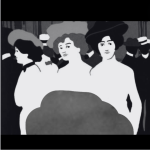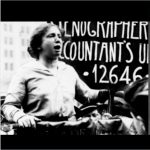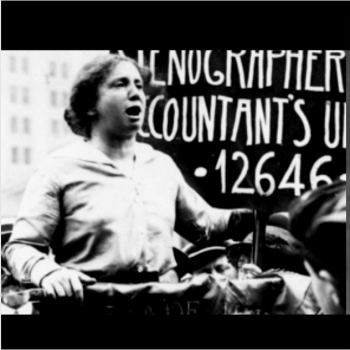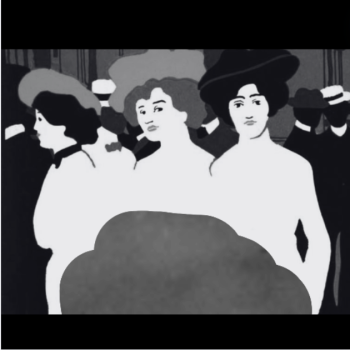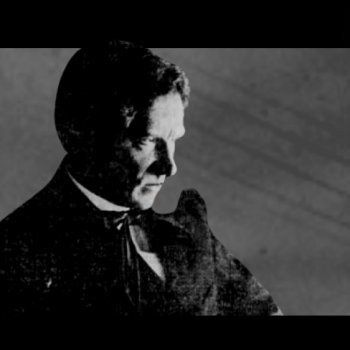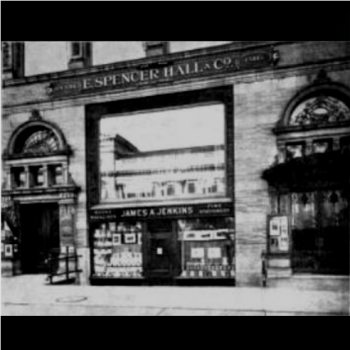The Christian Socialist Fellowship
“Socialism” was the topic for discussion by the newly formed Parkside Christian Socialist Fellowship, at a dinner given by the society at the Parkside Presbyterian Church on March 12, 1908. The pastor, John D. Long, born of missionary parents in Rajahmunda, India, had opened the church the teaching of Christian Socialism in January.
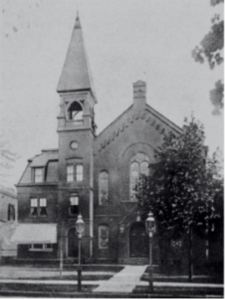
The Parkside Presbyterian Church.[1]
The national platform of the Socialist Party began making a push to enter the churches, labor unions, and universities.[2] A former preacher named George Davis Herron, and his wife, Carrie Rand (creators of the Socialist Rand School) had a hand in this.[3] Herron wrote the platform for the Socialist Party of America which stated that “there can be no possible basis for social peace, for individual freedom, for mental and moral harmony, except in the conscious and complete triumph of the working class as the only class that has the right or power to be.”[4] As for the Church itself, it was the aim of the Socialist Party to “turn church people into voting socialists.” To that end they established the Christian Socialist Fellowship. The Christian Socialist Fellowship declared that it had two ends in view:
First: To go after the church people and make voting Socialists of them. Second: To prevent the church people being side-tracked by some near-Socialistic and near-Christian movement, which shall lead them away from real Socialism and real Christianity.[5]
One of the leading members of the Christian Socialist Fellowship, Rufus W. Weeks, second vice-president and chief actuary of the New York Life Insurance Company, urged Socialism as the real meaning of the teachings of Jesus. He insists that the Master was “not only a working man, but a working-class man,” and that He had in mind the downfall of competition and the substitution of cooperation when He said, “The kingdom of God is at hand.” Weeks stated: “At hand!” now in a sense even more thrilling. In the sense that human cooperation is at last achievable; that the evolution of industry has created a breed of men—the proletariat—in whom the principle of union is compelling and automatic; that the tree is three-quarters grown, the lump three-quarters leavened; and that the lover of Jesus has only to throw in his lot with the workers in their struggle, to feel the strength of ten in every blow he strikes. Now therefore, at this moment, as never before, we may hear that awakening voice speaking from the unseen, though not far from every one of us, and saying “Revolutionize your ideas, for the era of cooperation is here!” This organ of Christian Socialism, as printed in an address of the Christian Socialist Fellowship, stated in part:
Believing that the church is today, for the most part, a force serving the cause of Capitalism, and that by means of the cause of Capitalism, and that, by means of the presentation of the truth within it, we can, in the spirit of the Carpenter of Nazareth, spike some of the guns of that battery and train them, as they should be trained, upon present system of organized selfishness; And believing that we can help to make the professed followers of Jesus the propagation of Socialism that they should be; We, who are all Christian men and women, and all Socialists, offer ourselves to the Socialist Party to be used in presenting the Socialist economic doctrine in any church, in the Y.M.C.A., or in any other organization which is closed to a Socialist propaganda that does not come under the name “Christian.”[6]
At the conclusion of the dinner, prepared and served by the women of the congregation, Long, as the toastmaster of the occasion, addressed the diners. The quartet of speakers were Alexander Irvine; Charles Edward Russell, the novelist; E. P. Wheeler, Secretary of the Christian Socialist Fellowship of Manhattan, and Catherine M. Meserole, wife of Darwin J. Meserole, founder of The Civitas Club.
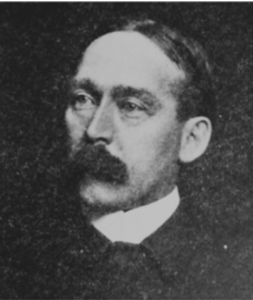
John D. Long.
Long first introduced Edwin D. Wheelock, Secretary of the Christian Socialist Fellowship of Manhattan, who sought to ensure that “the men and women at the head of this political movement are active church-workers and also active and genuine Socialists.”[7]
“I can consider Socialism the marrow of the Gospel of Christ, and not until I had given the subject my entire study for weeks did, I arrive at that conclusion,” said Dr. Long. “But my belief is a truly religious one, and Christian in every sense. The Parkside Presbyterian Church is the first one in the borough where the propagation of the Socialistic idea is being put into effect, but I predict that others will soon fall in line. When the subject is construed by pastors in the proper light, as the foundation of God’s word, the Parkside Church will not be alone in the teaching of Socialism.”
“I am pleasantly surprised to see that a church where Socialism is propagated is, indeed, a reality in Brooklyn,” said Wheelock. “While I thought it a possibility, the fact of there being one of such strength as Dr. Long’s is a joy and a boon to the cause. I am highly pleased to find a preacher who has the real courage of his convictions, and who has actually stopped to study and consider what the gospel means, as Christ taught it.”
Wheelock then referred to the arguments put forth by the opponents of Socialism, many of whom declared that human nature must be changed if Socialism were to ever be universally acknowledged. “They have not studied the question,” said Wheelock. “If these people could understand the Bible, and do God’s will, then they would learn how to establish Socialism to the power it will eventually attain. The people are slowly awakening. Oh, yes—when the people learn how to vote and bring about the right reformation of things offensive, through the means of Socialism, there will be no more difficulties and obstacles for them to trip up over in their fight for success.”
Wheelock then addressed a recent rumor that people were leaving their churches because Socialist-leaning pastors. “Those who will leave any church for such a cause are a few men who think more of their tainted money than they do of the true word of Christ. Socialism, my dear people, is a power of truth for which the common people have been long waiting, and it has come at last, for all men!”
Catherine Meserole followed Wheeler. She was listened to with strict attention, and she immediately scored a hit when she said that Socialism was “applied Christianity.” Meserole made, in her brief, address, a frequent use of the names of radical Socialists. When she pronounced the name of Eugene V. Debs, the applause was thundering. Going into the West, in her address, Meserole pointed with pride to Meyer, Haywood and Pettibone, and spoke about their trial. Of Socialism, she believes that it is tantamount to a restoration of a long-lost art. “Here, at last, fresh from the mouth of Christ. Socialism is an ideal principal worth propagating,” she concluded.
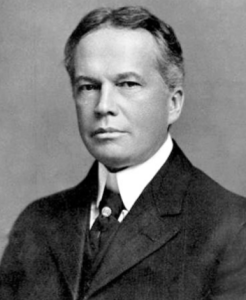
Charles Edward Russell.
The penultimate speaker of the evening, Charles Edward Russell said, “I am horrified to find in a great city like New York—yes, in a country like America—that political life Is barred from receiving the benefits of women campaign speakers, who are cut off from speaking publicly because they have no rights, no vote. I wonder, and doubt, whether the country will ever have political equality for men and women.
“It is time to stop our praise of the twentieth century, and our talk of 13-inch guns, and 10,000-ton battleships,” Russell continued, avoiding mention of Roosevelt (for it was a chief rule among the Socialist not to mention names.) “…that political monstrosity at Washington.” Russell concluded by declaring Socialism to be the cure for the present uneven social conditions; of producing on one side mendicants, and on the other millionaires. “Socialism,” said Russell, “is equivalent to equality!”
Irvine was the last speaker. He proved a powerful speaker. He started by saying that the “new church idea,” was beginning to take Socialism as a basis of the gospel—and not a “water-logged church sermon. Every church in Brooklyn, that is, the water-logged churches,” he said, “should have a ‘God of laughter’ at the front door for the people going out.
“They need something to take the strait-lacedness out of them and give them a sense of humor. When I think of the church mutterings, and its priests, and the spires from all corners, I am put in mind of a paper of tacks—pointing In all directions. I am ashamed of the modern church, and of that church with its history, steeped in blood and woe. I was once out of the Presbyterian Church, but am now back, but for how long I don’t know.”[8]
PEOPLE OF THE UNDERWORLD
I. INTERCOLLEGIATE SOCIALIST SOCIETY.
II. THE CRY OF PEONAGE.
III. MUCKERS.
IV. GALLAGHER’S HELL.
V. PUNK.
VI. SOUDAN.
VII. BOWERY.
VIII. “IT IS A BETTER FLAG THAN THE AMERICAN FLAG.”
IX. PENETRATING THE ASCENSION.
X. “THE UNIVERSE IS BASED ON THE SUBJECTION OF WOMAN.”
XI. PROGRESSIVE WOMAN SUFFRAGE UNION.
XII. THE CHRISTIAN SOCIALIST FELLOWSHIP.
XIII. THE ERUPTION OF THE END.
SOURCES:
[1] “Religion In Flatbush.” Flatbush Of Today. Vol. II, No. 1 (April 1908): 37-60.
[2] Creelman, James. “America’s Trouble-Makers.” Pearson’s Magazine. Vol. XX, No. 1. (July 1908): 3-28.
[3] Dole, Nathan Haskell. “Notes From Boston.” Book News. Vol. XIV, No. 161 (January 1896); “The Rand School.” The Evening Standard. (London, England) January 9, 1907; Creelman, James. “America’s Trouble-Makers.” Pearson’s Magazine. Vol. XX, No. 1. (July 1908): 3-28.
[4] Creelman, James. “America’s Trouble-Makers.” Pearson’s Magazine. Vol. XX, No. 1. (July 1908): 3-28.
[5] “Constitution of the Christian Socialist Fellowship.” The Christian Socialist. Vol. V, No. 13 (July 1, 1908): 5.
[6] Creelman, James. “America’s Trouble-Makers.” Pearson’s Magazine. Vol. XX, No. 1. (July 1908): 3-28.
[7] “Constitution of the Christian Socialist Fellowship.” The Christian Socialist. Vol. V, No. 13 (July 1, 1908): 5.
[8] “Socialism The Theme At Church Club Dinner.” The Brooklyn Daily Eagle. (Brooklyn, New York) March 13, 1908; “Mixing Gospel With Socialism.” The Standard Union. (Brooklyn, New York) March 13, 1908.


